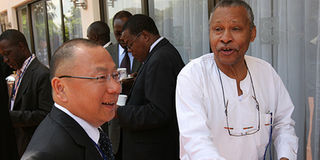China dismisses US claims over Africa

Stephen Mudiari | NATION
Mr Du Xiaocong (left), African Department counsellor in the Chinese Ministry of Foreign Affairs, with Prof Mohamed Salih of the University of Rotterdam in Netherlands at the opening of a two-day meeting in Nairobi on March 28, 2011.
What you need to know:
- Chinese ambassador to Kenya says allegations in embassy’s leaked cables were sensational
China has dismissed as “sensational” claims by the US it was employing dirty tricks to gain a foothold in Kenya.
Leaked US diplomatic cables described Chinese firms as using bribes, cut-throat pricing strategies and coercion through senior government officials to win lucrative deals in the sector, a trend that US government officials in Nairobi saw as detrimental to the industry’s growth prospects.
Chinese ambassador to Kenya Liu Guangyuan on Monday told a continental meeting of researchers in Nairobi that some governments were getting jittery over Beijing’s increasing profile in Africa.
The theme of the conference, that ends on March 30, is Understanding China-Africa Relations.
In a hard-hitting speech that would be interpreted as responding to the US over the leaked diplomatic cables that portrayed Beijing as exploitative and using dirty tricks to win over Kenya, Mr Liu denied China was recolonising Africa.
“It is obvious that some in the world seem to be not very comfortable to see China and Africa mingling so well and are saying China is no longer a developing country, that China no longer needs Africa,” Mr Liu said.
“Some have gone so sensational as to claim that China is repeating the colonial path of exploiting Africa. Well, I shall not trouble myself to explain anything, because it is totally unnecessary,” he added.
China’s growing influence in Africa, and Kenya in particular, has caused jitters in Western capitals whose vendors have lost ground to their Chinese counterparts.
“Chinese firms selling into Kenya’s ICT sector are throwing a lot of money around, according to industry contacts. Indeed, Chinese influence may be so great that it is distorting important investment decisions in the country,” a cable from the US embassy in Nairobi dated October 2007 stated.
“Chinese influence is so great that it is actually distorting critical investment decisions in Kenya’s all-important ICT sector. For further investigation is the role of the Chinese Government.”
But Mr Liu was categorical that Sino-Africa relations were of mutual benefit.
“I believe our African friends are so wise that you can definitely judge from your own feelings to tell the right from the wrong. But I want to say that treating each other on an equal footing, mutual benefits and win-win strategy are the unswerving principle of Focac (Forum on China-Africa Cooperation),” the envoy said.
He explained that both China and Africa were committed to jointly establishing a new strategic partnership marked by political equality and mutual trust, economic win-win cooperation and cultural exchanges and mutual learning.
Medical Services minister Anyang’ Nyong’o, who was the keynote speaker at the conference, urged African governments to emulate China in implementing urban renewal and rural development, infrastructure, medicine and social discipline.
Prof Nyong’o said Kenya had a lot to learn from China on devolution.
“The Sino-Africa relation is something that should now go beyond trade and commerce,” the minister said, adding that those ties dated back to pre-colonial period.
China today maintains a heavy presence in Africa, opening Confucius Institutions in 13 countries on the continent. In Kenya, the Confucius Institutes are at Nairobi and Kenyatta universities.
In terms of trade, China-Africa relations continue to achieve new progress. Trade volumes between China and Africa reached $127 billion (Sh10 trillion) in 2010, up nearly 40 per cent.
“Both China and Africa suffered colonialist invasion and internal disorders. That’s why we value national reconciliation and social stability so much,” Mr Liu added.




